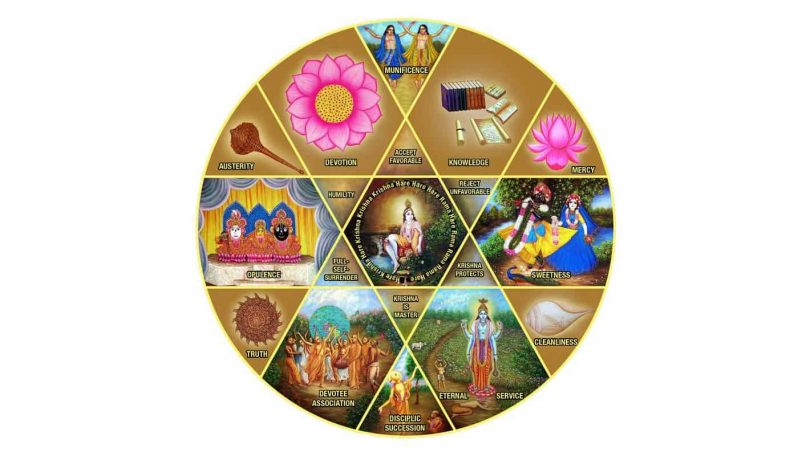Questions Preface: Thanks so much for all the inspiration you have given me in Krishna consciousness through your lectures and the Q&A forum. I have a question regarding the differences between bhakti yoga and nishkama karma yoga on the platform of knowledge (detached from work and fruits of the work, but still performing work as per Krishna’s injunctions in chapter 3). It seems that sometimes these two terms are used interchangeably and sometimes they are distinguished. Based on this, I have a few questions:
Q. 1. Is work performed with detachment to work and the fruits of the work offered to Krishna – ALWAYS bhakti yoga or could it also be nishkama on the platform of jnana based on some factor – maybe the kind of work being done (the factor about detachment from work and fruits being offered to Krishna being same).
Answer by Romapada Swami: Generally, ‘nishkama karma yoga’ refers to performing prescribed duties without attachment to the fruits. Such a worker is not necessarily detached from the work itself, nor does he necessarily dedicate the results to Krishna.
A ‘jnani’ (one who is cultivating knowledge of transcendence) or a ‘brahma-vadi’ is a typical example: there is knowledge that one is spirit soul, different from matter, but there is not an understanding of the Supreme Soul yet. When their knowledge further advances to include knowledge of Vishnu, by coming in contact with vaishnavas, the nishkama karma yogi begins to dedicate the fruits to the Supreme Lord.
In other words, one can perform nishkama karma yoga on two levels, depending on the advancement of one’s transcendental knowledge. In the first, one dutifully performs prescribed work with detachment (based on knowledge that we are not this body), without necessarily offering the fruits to Krishna in devotion. The other offers the results of one’s labor to Krishna, while still being attached to the specific type of work he does – the latter is a devotee who knows that the goal is Krishna but is not yet on the platform of pure devotion. This is a superior stage of nishkama-karma-yoga. In pure bhakti yoga, on the other hand, the sole impetus for work is surrender to the order of Guru and Krishna.
For our benefit, Srila Prabhupada often explains those verses which describe nishkama-karma-yoga from the platform of bhakti, in light of the ultimate purpose of Bhagavad Gita, as explained in response to Question 2 below. Thus by his explanations we are immediately promoted to this higher stage, without having to go through the gradual, step-by-step process of attaining knowledge of Krishna and then dedicating the results to Him.
Q. 2. BG 3.30 reads: “Therefore, O Arjuna, surrendering all your works unto Me, with full knowledge of Me, without desires for profit, with no claims to proprietorship, and free from lethargy, fight.” – is this a definition of nishkama karma yoga or is this bhakti yoga?
Answer by Romapada Swami: Here Krishna is directing Arjuna to surrender all work unto Him. Working in full knowledge of Krishna without proprietorship and desires for profit is nishkama-karma-yoga, but when the work itself is surrendered to Krishna, it comes to the platform of bhakti – work done for the pleasure of Krishna. Srila Prabhupada points out that this verse 3.30 clearly indicates the purpose of BG. Although in previous verses Krishna exhorts Arjuna to work out of duty and with detachment, in this verse He reveals the purpose of the Gita, viz. to act for His pleasure.
Q. 3. I have also heard BG 9.27 “Whatever you do, whatever you eat, whatever you offer or give away, and whatever austerities you perform-do that, O son of Kunti, as an offering to Me.” being nishkama karma and verses like 9.26 (“If one offers Me with love and devotion a leaf, a flower, fruit or water, I will accept it.”), 9.22 (“But those who always worship Me with exclusive devotion, meditating on My transcendental form to them I carry what they lack, and I preserve what they have.”) and similar verses as Bhakti Yoga. Is this a right understanding?
Answer by Romapada Swami: There are different systems of analyzing these verses; it is not that one system is THE system, thus dismissing all others.
Bearing this in mind, let me reiterate the main point I have been emphasizing thus far. As mentioned before, the prominent distinguishing factor between these two terms is that a nishkama karma yogi dedicates the fruits of work but remains attached to the work itself; the upper end of nishkama karma yoga overlaps into the realm of karma-misra-bhakti. In pure bhakti, on the other hand, the work itself is done exclusively for the pleasure of Krishna—like the gopis decorating themselves *JUST* to please Krishna.
For example, one may very much like to sing – an activity one derives great pleasure from and one may dovetail this propensity in service to Krishna by singing in kirtana for the pleasure of the Deities. Whereas for one on the platform of pure bhakti yoga, the act of singing itself is done simply because it pleases Krishna regardless of how much one personally likes /dislikes the activity.
Similarly, one may have an inclination for a certain type of work, such as teaching or business or management, and one may engage in an occupation that suits his propensity while being detached from the results which is offered in Krishna’s service – this is nishkama karma yoga, or karma-misra-bhakti. In contrast, a practitioner of pure bhakti yoga would perform his work simply for pleasing Krishna — remembering Krishna while executing such occupation and performing the occupation itself according to the instruction of Krishna or His representative. He is not attached to a particular type of work but is willing to act in any capacity as directed by Guru and Krishna. He works for Krishna’s pleasure and earns for Krishna’s pleasure, he shops for Krishna and cooks for Krishna, all the while absorbed in meditation of serving Krishna, and thus naturally the results that come from that work are directly engaged in service to Krishna. This is the spirit of bhakti-yoga: “offering with love and devotion a leaf, flower, fruit or water.”
For one who has not yet attained this stage of attachment to Krishna, the Lord then recommends, “Never mind whatever you are doing, offer the results to Me.” This is karma-yoga.
Q. 4. In the 3rd chapter when Gita explains about King Janaka, is King Janaka referred to as an example of having performed nishkama karma yoga?
Answer by Romapada Swami: Yes. As Srila Prabhupada explains in the purport, Janaka being a great devotee was transcendentally situated, but he was setting an ideal example for his subjects how to perform prescribed duties without attachment.







